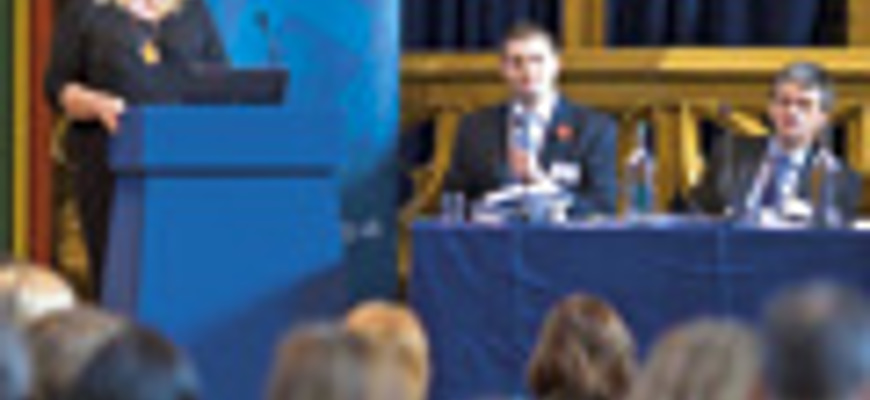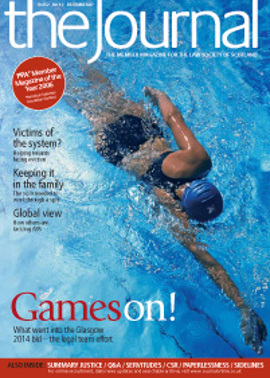Defining moment

“It may seem a small thing in itself, but it is of immense value.” So the Law Society of Scotland’s President, Richard Henderson, summed up the In-house Lawyers Group’s annual conference as he addressed the gathering.
Before a sizeable audience gathered at The Hub, Edinburgh, he explained: “A conference such as this helps to define a group and allows it to present that definition to the world, stating what it stands for and what it offers.”
Having spent his career as an in-house lawyer, rising to become Solicitor to the Scottish Executive prior to his retirement this year, the President is well qualified to set the in-house role in the context of the wider profession. And identifying the core issue currently facing all lawyers as, “whether Scotland wants, and whether we as lawyers want, a legal profession, rather than a collection of people engaged in the practice of law” – and more importantly, he added, what sort of profession that should be – he pointed to the esprit de corps fostered by the group’s programme of events as something that could point the way forward for the whole profession.
“What I say therefore is not a challenge to the existence of an in-house group, but an invitation to look at how we can share that success in the development of the profession as a whole.”
Business structures, standards, education and training, and the overarching strategy for the Council and the Society, he told the meeting, are all issues of current debate which affect the profession as a whole and “need your input”.
“At the base of all of those issues lie the core values of the profession”, the President continued. “Those core values are the glue which holds a profession together and allows it to develop.” Adding that the core values affect in-house lawyers as much as any other lawyers, he observed: “If employers want to employ lawyers in-house, that will be in part because they want those core values to be built into their undertakings.”
The President was convinced that a proper regime of law sits at the heart of any civilised society, being essential not only to ensure justice and democratic government but also as “a critical underpinning for economic success”. Equally, it has to be supported by a strong and independent legal profession, as the “guarantor of compliance and the facilitator of development and of success”.
That in turn, he concluded, requires a properly focused and directed representative professional body, comprising all sectors of professional activity and all shades of professional opinion; “and that in-house lawyers are central to the development of such a future”.
Angiolini: real checks and balances
Earlier, in her keynote address to open the conference, Lord Advocate Elish Angiolini QC – who also made her career in-house – reflected on the current debate surrounding the role of the Lord Advocate, and on the wider context of legal advice to the government.
“It is always important to ensure that law is at the forefront of ministerial decisions”, she declared. “The in-house lawyer derives support and strength from the knowledge that they give independent advice. The notion of compliant civil servants is quite frankly ill informed.”
The standards seen in government, she was certain, would be present in every good in-house team.
A career in the Crown Office and Procurator Fiscal Service would not normally be seen as preparation for life in the goldfish bowl of political and public scrutiny, but Angiolini is, if not completely at ease with the situation, at least more than willing to get to grips with it. Recognising that the law officers’ profile is much greater under devolution than in the Westminster context, she commented: “Life as a law officer is now more uncomfortable, but that is probably a good thing.”
The Lord Advocate rehearsed the by now well known arguments over her combined role as prosecutor and government legal adviser, pointing out that other countries such as France, which are approaching the prosecutor’s position from a different direction, are also re-examining their own structures against the requirements of the European Convention on Human Rights.
“I’m not persuaded that changing the structure [i.e. by separating her prosecution and legal advice functions] would solve the underlying problem”, she commented. The constitution had evolved since devolution and would continue to do so. The real issue in modern society was how to confer powers and still be satisfied that they will be exercised properly; it required “real checks and balances, not just fine words on a page”.
Preserving the balance, she maintained, “doesn’t come just from statutes and structures but from pluralism in public institutions”. In her own case the checks and balances were both internal, in the form of her advocates depute, and external, such as the constant public scrutiny, an independent legal profession bringing questions to court, the independent inspectorate of prosecution, and our independent judges.
With Scotland experiencing minority government for the first time, one of a different political complexion to that at Westminster, she described the current session as “an extraordinarily exciting period to be involved in government”.
Topical programme
Our cover feature this month showcases another of the day’s highlights, John McKinlay’s inside account of the immense work involved in underpinning Glasgow’s 2014 Commonwealth Games bid – the success of which was not to be known until a week after the conference. No doubt even that effort will be put in the shade by the undertaking of making the Games themselves happen. Add to that presentations on the effects of the Companies Act 2006, discrimination issues, the new Planning Act, and Paul Gilbert’s guide to surviving change – all covered, if in less depth, in recent issues of the Journal – and one could say that ILG chairman Janet Hood’s characteristic ebullience at the outcome of the event was more than usually justified.
To pick out a few highlights from her own report: the ILG membership has risen since last year from 2,485 to 2,559 members (25.80% of solicitors holding practising certificates); the Group is reviewing its members’ services on the back of a series of roadshows in which committee members visited different parts of the country, an exercise it intends to continue; for the first time it took a stall at some of the university law fairs to raise the profile of working in-house; and it took an active part in current issues affecting the profession as well as continuing its own seminar programme and building links with other organisations such as SOLAR and SYLA.
“This has been a busier year than usual and I would like to thank all my committee members and the committee secretary for dealing with their workload with such enthusiasm and good humour”, she concluded.
BAR CONFERENCES: STRENGTH TO STRENGTH
“The 21st Century Bar”, the annual joint conference of the Faculty of Advocates and the In-house Lawyer Group, took place this year on 30 November.
J Gordon Reid QC opened the conference, which examined a range of issues from company and contract law to employment law, public law litigation and the use of mediation and other forms of dispute resolution.
Colin Anderson, vice chairman of the ILG and legal manager at Standard Life, said: “This is the eighth year of the conference and it is now a key date in Scotland’s legal calendar.
“The Faculty has always been highly supportive, with a number of the most experienced QCs speaking at the event, and I look forward to its continued success. This year’s programme highlights areas of law where there has been significant change, and the conference itself gives in-house lawyers a welcome opportunity to meet with and discuss current legal issues with advocates.”
In this issue
- Discounting justice
- Common sense prevails
- Common sense prevails (1)
- Shaping the future
- Working in a one-stop shop
- Christmas lesson
- Games City
- OFT-related FAQs
- Sea change around the globe
- Covering the money gap
- Pre-trial priorities
- Personal touch
- Keeping money clean
- The lions sleep tonight
- Conversion course
- Family law risk management
- Too well known to challenge
- Temp sheriffs immune after all
- Camels and common sense
- Tough at the TUPE
- Are bloggers fair game?
- "This ain't tiddlywinks, mate"
- Scottish Solicitors' Discipline Tribunal
- Website reviews
- Book reviews
- Defining moment
- Clear view
- Joint conference success






